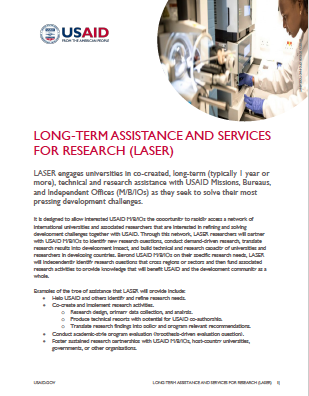Speeches Shim
LASER engages universities in co-created, long-term (typically 1 year or more), technical and research assistance with USAID Missions, Bureaus, and Independent Offices (M/B/IOs) as they seek to solve their most pressing development challenges.
It is designed to allow interested USAID M/B/IOs the opportunity to rapidly access a network of international universities and associated researchers that are interested in refining and solving development challenges together with USAID. Through this network, LASER researchers will partner with USAID M/B/IOs to identify new research questions, conduct demand-driven research, translate research results into development impact, and build technical and research capacity of universities and researchers in developing countries. Beyond USAID M/B/IOs on their specific research needs, LASER will independently identify research questions that cross regions or sectors and then fund associated research activities to provide knowledge that will benefit USAID and the development community as a whole.
Examples of the type of assistance that LASER will provide include:
- Help USAID and others identify and refine research needs.
- Co-create and implement research activities.oResearch design, primary data collection, and analysis.
- Produce technical reports with potential for USAID co-authorship.
- Translate research findings into policy and program relevant recommendations.
- Conduct academic-style program evaluation (hypothesis-driven evaluation question).
- Foster sustained research partnerships with USAID M/B/IOs, host-country universities,governments, or other organizations.
THE NETWORK:
Purdue University will lead the LASER Partners for University-Led Solutions Engine (LASER PULSE) consortium in establishing a dynamic and open network of university-based researchers across the countries and technical sectors in which USAID works. The Consortium’s initial network comprises 56 universities from 24 low- and middle-income countries (LMIC), in addition to 8 US universities, including 5 minority-serving institutions. The LASER award to the PULSE consortium will run for five years, from 2018-2023 and the network of universities will continue to grow and expand throughout this time period.
THE CONSORTIUM:
The LASER PULSE consortium harnesses the collective research and engagement power of Indiana’s leading universities with the international development and academic expertise of their Non-Governmental Organization and international partners. In addition to Purdue, this consortium includes:
- University of Notre Dame
- Indiana University
- Makerere University, Uganda
- Catholic Relief Services (CRS)


Comment
Make a general inquiry or suggest an improvement.